Physical Address
304 North Cardinal St.
Dorchester Center, MA 02124
Physical Address
304 North Cardinal St.
Dorchester Center, MA 02124
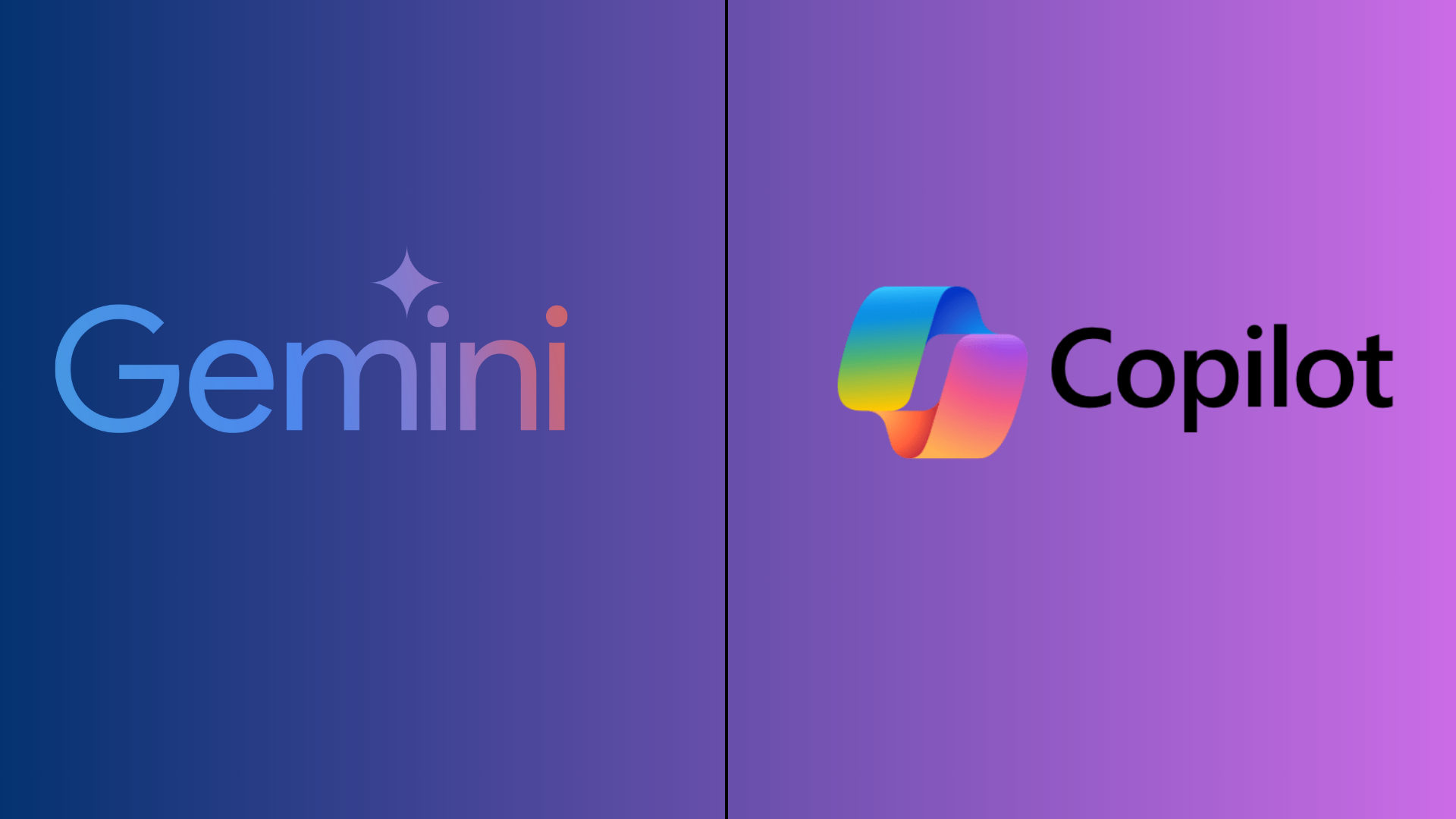

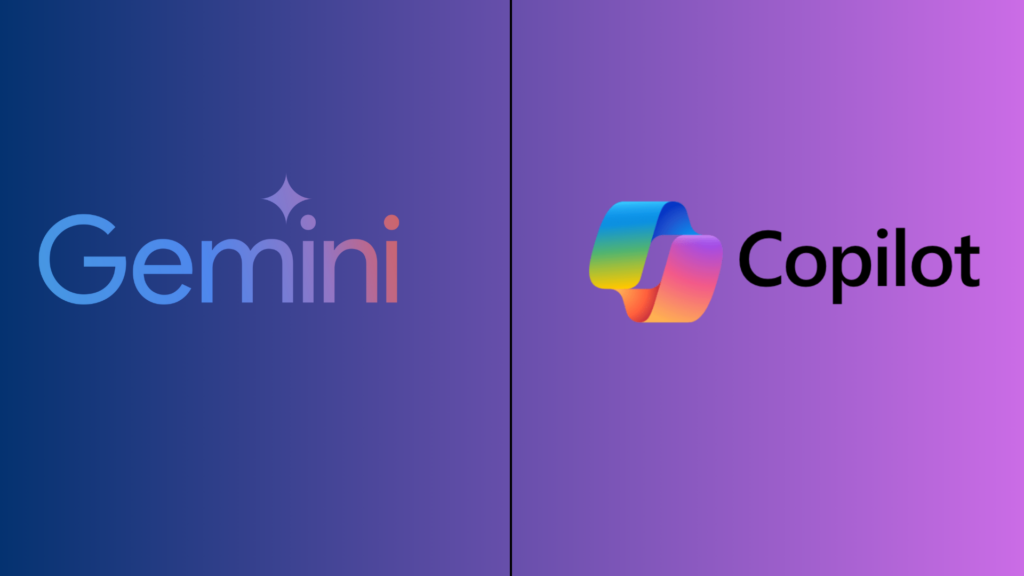

In 2024, AI has become essential for companies of all sizes. Whether you are a tech giant or a smaller startup, incorporating AI assistants into your workflow can increase work efficiency significantly.
And if you are not using AI assistants, your competitors are, giving them an edge over you.
So, choosing the right AI assistant is important. Microsoft Copilot and Google Gemini are two of the most notable AI assistants leading this charge.
Both are making waves in the industry by offering generative AI capabilities, but they approach their goals in distinct ways.
While Copilot is deeply embedded into the Microsoft 365 suite, Gemini works across the Google workspace.
Instead of stating the obvious, let’s compare the facts and features.
Microsoft launched Microsoft Copilot in March 2023 as a part of their broader strategy to integrate Generative AI into their productivity tools( Word, Excel, PowerPoint, Outlook, etc. ). It is powered by OpenAI’s GPT (Generative Pretrained Transformer) models. Now, Copilot uses the same AI model as ChatGpt.
Google launched Gemini on December 6, 2023. Both Deepmind and Google Brain collaboratively developed Google Gemini.
Unlike other language models like OpenAI’s GPT (which Microsoft copilot uses), which are typically trained on texts alone, Google Gemini tends to be multimodal in nature. This means you can interact with a wide variety of data types (images, videos, info-graphs, charts, etc.)
Microsoft Copilot and Google Gemini have their strengths and weaknesses, depending on what you need from an AI assistant. Let’s break down the pros and cons of each to help you understand their respective advantages and limitations.
Cons:
Pros:
Cons:
If it’s still not enough, here’s a list of other Microsoft Copilot alternatives.
Now let’s compare their core features:
Microsoft Copilot: With a partnership with GitHub Copilot, which is great for code generation and suggestions across all programming languages (python, Javascript, Java, etc.), It provides contextual code completion, bug detection, and code suggestions, making it a must-have tool for developers. It plugs directly into VS Code and other IDEs for live code help.
Google Gemini: Offers code completion and basic code generation. Unlike Microsoft Copilot, which uses GitHub (a highly well-known tool among developers), Gemini uses Google’s language models for code suggestions.
However, it is not as advanced as GitHub Copilot since it is still undergoing development. Gemini is more abstract and code-centric and isn’t so much part of developer IDEs.
It can help with a lot of the trivial code but doesn’t provide as much help or integration into the development lifecycle as Copilot.
Microsoft Copilot: Built right into Microsoft 365 (Word, Excel, PowerPoint, Outlook). It has the same UI pattern as Microsoft’s classic interface, which makes it natural for anyone who is used to the Office environment.
The assistant shows up as a side panel or toolbar widget, so you can use it without interrupting the workflow.
Google Gemini: Same for Google Workspace (Docs, Sheets, Gmail, etc.). Gemini’s UI is sleek and minimal, and it syncs with Google’s tools either via a chat bar or simple prompts. It is made with simplicity and usability in mind as if it were the Google brand for easy use.
Microsoft Copilot: Built into Microsoft 365 apps, Copilot functions in Excel, Word, PowerPoint, and Outlook so users can benefit from AI suggestions directly in their tools.
It also connects with Azure OpenAI and Power Automate for higher-level workflows and enterprise-grade systems and data sources.
Other than that, Microsoft’s integration is really limited and confined to its own apps.
Google Gemini: Aimed at Google Workspace and Google Cloud-using teams primarily. Gemini syncs directly with Google Search for real-time data, Google Docs and Sheets for document and spreadsheet analysis, and Google Drive for file storage.
It also utilizes Google Cloud for real-time analytics and data processing, which is great for cloud-based scenarios.
However, similar to Microsoft copilot’s limited integration with its own apps, Gemini’s integration is limited to Google apps.
Microsoft Copilot: Contextual awareness shines in Microsoft Office apps. Copilot can search for existing documents, spreadsheets, and emails to make suggestions based on that content and schedule content.
It is good at structured data (e.g., spreadsheets) and documents and, therefore, is ideal for business functions such as data analysis, report writing, and email writing.
Unfortunately, when it comes to Chatbot, Microsoft Copilot seems to “forget” contexts over extended conversation. Users complain about having to remind the chatbot about the context over and over again.
Google Gemini: The best thing about Gemini is that their chatbot excels at generating long-form content and understanding prompts from previous conversations.
Powerful in multimodal contextual analysis, Gemini doesn’t only analyze words but images, videos, and other content. This makes it especially effective when working on design (for example, for presentations or creating images).
It can also parse the meaning from different inputs (text+picture, text+video) for better contextualization and Understanding of outputs.
Microsoft Copilot: Designed for productivity in Microsoft tools like Excel, Copilot automates functions such as analysis of data in Excel (for creating summaries patterns), content creation in Word (for writing documents, developing insights), and email management in Outlook (for writing replies, summarizing threads).
Sync with Power Automate also gives you more power to automate your tasks with workflow across applications.
Google Gemini: Performs automation across the Google suite of products, from Google Sheets Automation with Google Apps Script to real-time data processing within Google Docs and Drive.
Its connection to Google Cloud makes it possible to automate advanced functions such as dynamic data analysis and artificial intelligence decision-making. It works especially well for workflows that need to have access to live data or share between cloud tools.
Gemini’s AI chatbot is a better writing assistant in terms of long-form writing, content generation, and brainstorming ideas compared to Microsoft Copilot.
But their chatbot tends to get slow often. Other than that, their chatbot is great at understanding prompts and contexts; you just might have to wait for a while to get answers.
However, as Gemini is still under development, let’s hope they’ll fix the lagging in the next update.
Microsoft Copilot’s chatbot, on the other hand, is better at handling complex tasks. Copilot offers powerful contextual integration with Word, Excel, PowerPoint, and Outlook and is ideal for data analysis and productivity tasks in a business setting. And it’s comparatively faster than Gemini’s chatbot.
Here’s a screenshot from when I asked Microsoft Copilot and Gemini chatbots the question, “How do AI chatbots work?“. It turns out that Gemini indeed gives more thorough and long-form answers, which might be helpful for content writers. It even had drafts to choose from.
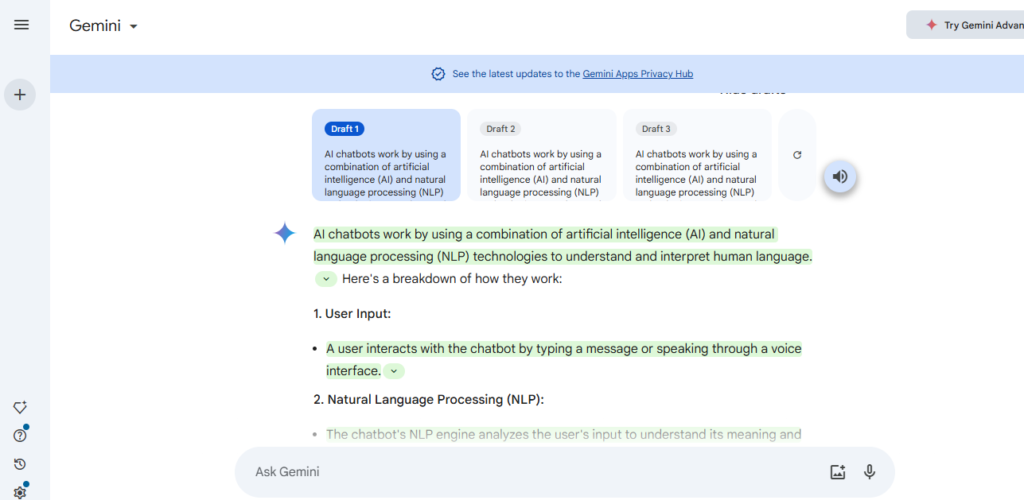

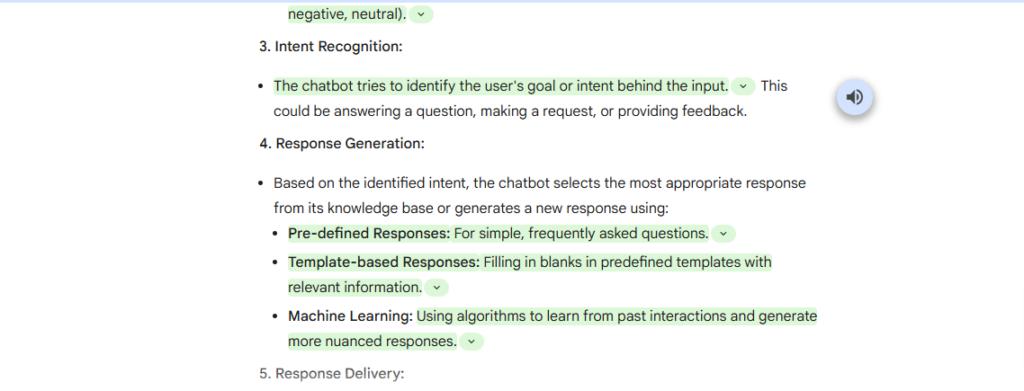

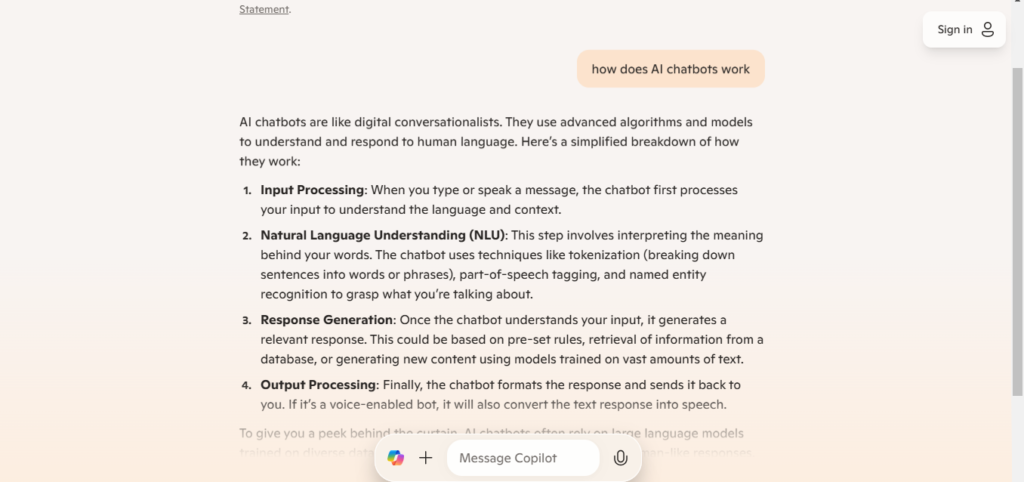

The option to go with Gemini Advanced or Copilot Pro is going to come down to what you’re already familiar with and what you’re trying to get assistance with.
Copilot Pro is perfect if you’re buried in Microsoft 365 (Word, Excel, Outlook) to automate repetitive tasks and data analysis and boost document and email productivity. It is designed for teams requiring Microsoft toolset integration.
Otherwise, if you’re working in the Google Workspace space (Docs, Gmail, Sheets), Gemini Advanced comes out on top with its capacity for creative work such as writing, brainstorming, and content creation. It is best at conversational AI with natural multi-turn dialogues and open-ended tasks.
For a team that blends both ecosystems, Gemini Advanced might be great for ideas and email-related tasks, and Copilot Pro is better for data-heavy, structured work.
Prices: Copilot Pro costs about $30/user/month with Microsoft 365, and Gemini Advanced is also $30/user/month with basic Google Workspace, with extras for the advanced options.
Microsoft Copilot:
Business Plan:
Enterprise Plan:
With the $30 plan, you’re typically getting added security, compliance, and administrative features for large companies as well.
Google Gemini Advanced:
Business Plan:
Enterprise Plan:
Although their pricing is similar, Gemini is likely more cost-effective for creative users, while Copilot is more efficient for business productivity users. Note that there’s no free trial for Microsoft’s Copilot. You would need to subscribe to Microsoft 365 to get access to Microsoft Copilot Pro. If you are looking for a free version or even a free trial, for that matter, Gemini is the better option.
Here’s a summary of what we’ve compared about Microsoft Copilot and Gemini so far:
| Feature | Microsoft Copilot | Google Gemini |
|---|---|---|
| Ratings | 4.6 (Capterra) | 5 stars (Capterra) |
| Free Trial | Not available | Available |
| Core Focus | Productivity tools (Excel, Word, PowerPoint, Outlook) | Creative tasks, content generation, multimodal AI |
| Integration | Deep integration with Microsoft 365 apps | Integrated with Google Workspace (Docs, Sheets, Gmail) |
| Multimodal Capabilities | Limited (focused on text) | Strong (text, images, video, etc.) |
| Code Assistance | Advanced (via GitHub Copilot) | Basic (code suggestions, but less advanced) |
| Data Access | No live web access; works within Microsoft 365 | Live data access via Google Search |
| User Interface | Integrated into Microsoft 365 apps, side panel UI | Integrated into Google Workspace, minimal UI |
| Security | Strong enterprise security | Concerns around data privacy with Google ecosystem |
| Task Automation | Strong in Excel, Word, and Outlook | Strong in Docs, Sheets, and Google Cloud |
| Contextual Understanding | Struggles with complex conversations outside Office apps | Excellent conversational AI with long-form and multimodal understanding |
| Pricing | $20/user/month (Business), $30/user/month (Enterprise) | $20/user/month (Business), $30/user/month (Enterprise) |
| Free Plan | No free plan, requires Microsoft 365 subscription | Free AI features in Google Workspace (Docs, Gmail, Sheets) |
| Best For | Microsoft 365 users needing business productivity | Google Workspace users needing creative AI and multimodal tasks |
| Ideal Use Case | Data analysis, report writing, email automation, code assistance | Content creation, brainstorming, real-time insights, design tasks |
| Limitations | Limited to Microsoft tools, no web access | Lacks advanced code support, limited integration with non-Google tools |
If you have a choice between Microsoft Copilot and Google Gemini, it all depends on what you need and the ecosystem you prefer.
Microsoft Copilot is a perfect fit for businesses that are deeply committed to Microsoft 365. It is highly efficient for productivity tasks such as data analysis, document automation, and email automation and is a great fit for organizations dedicated to efficiency and business management.
Copilot is ideal for those who require code support — thanks to its integration with GitHub and high-end enterprise security. However, it only integrates with Microsoft tools and lacks live data.
Google Gemini, on the other hand, excels in creative work such as content creation, brainstorming, and design. Multimodal (text, image, video) and powerful conversational AI make Gemini the ideal choice for Google ecosystem teams who care about creativity and real-time information.
It also comes with cheaper free features in Google Workspace, making it an attractive alternative for smaller teams or people looking for a more portable AI assistant.
All in all, Copilot is ideal for business productivity and data-heavy tasks. Gemini is better, if you’re more into creativity, multimodal work, and cheap-start.